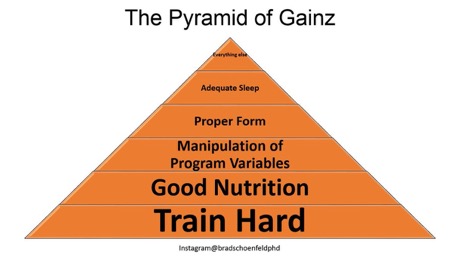This is fast way to hypertrophy – Sleep!
Today’s society is focused on hard work, and taking time off is sometimes totally out of the picture. Further in the chain it often leads to increased stress levels resulting in injuries and illnesses. Rest is very important and don’t neglect it!
Basic definitions we should know before reading further are:
Hypertrophy is an increase in cross-sectional area of muscle and muscle volume. In translation – muscle becomes bigger.
There are three mechanisms that determine muscle growth – mechanical tension (the force produced by the muscle), muscle damage (microtrauma) and metabolic stress (the accumulation of metabolites). (1) The adaptation of body to stress results in muscle growth.
Sleep is a natural periodic absence of consciousness during which the organism is regenerated. (2) Sleep is the basis for the functioning of the organism. Lack of sleep is hazardous for health and can lead to problems with nutrition, glucose control, elevated blood pressure, cognitive functions and hormonal work. (3) In extreme cases even to death.
Brad Schoenfeld, the world’s leading authority in the field of hypertrophy, demonstrated in the pyramid the key factors for gaining muscle mass: hard training, good nutrition, manipulation of program variables, proper form, quality sleep and only then rest.

As far as hypertrophy is concerned – you will grow even if you perform the exercises with a bad form. You’ll grow, but you’ll probably get hurt. The problem can cause serious injuries that may result in surgeries and cessation of training.
- We don’t want that!
The pyramid shows that training is the basis and that it is possible to achieve hypertrophy by a large volume of training (you must have met individuals who perform exercises with a bad form but have prospered). There is a smarter way in which it is possible to have a safe way to reach a sustainable fitness.
Impact of sleep on hypertrophy
From the definition at the beginning we see that a certain amount of stress is needed for the hypertrophy and that the dream is necessary for the body to recover and prepare for new efforts. Logic tells us that if we train too much, and we don’t rest enough, it won’t be good for us. Luckily, we also have scientific evidence confirming that assumption.
Hormones and synthesis of proteins
In a review from 2011. (3) the Dattilo and associates demonstrate that there is evidence that testosterone (the main anabolic hormone in the body) is capable of inhibiting miostatin (responsible for blocking growth hormone). In the absence of sleep, cortisol levels (catabolic hormone, opposite testosterone) are elevated and this results in catabolism and decreased protein synthesis. Also, there is a study on persons who in the period of 72 hours had interrupted sleep and consequently a higher level of excretion of the urea indicating increased proteolisis. (4)

Reduction of subcutaneous fatty tissue
Study (5) was conducted on 44 subjects in which the authors tested differences in eating habits (macronutrients, quantity of calories and meal time) after 2 nights with 10 – 12 hours in bed that followed with 5 nights 4 hours sleep. The results indicate that subjects in days with less sleep consumed more calories, more calories were from fat, and more desserts and salty snacks were consumed during the night hours.
In the following work (6) Nedeltcheva et al. compared 10 obese people (average BMI = 27.4) on 14 days calorie diet and they found that persons who in average slept 5,5 Hours and 8.5 hours lost the same number of kilograms (3 kg and 2.9 kg). However, the important difference was observed in the ratio of fatty to muscle tissue! Persons who have slept less (5.5 hours) have lost 55% less subcutaneous tissue and 60% more muscular mass!

This study suggests that the secretion of hormones, as a result of sleep deprivation, can greatly affect the composition of the body.
Impact on strength
In the review paper (7) from 2017 the authors concluded that the lack of sleep negatively affects the maximal muscle strength in complex movements (the most efficient for the development of strengths) and suggested adding stimulation in the form of supplements or motivation in such cases.
Sleep at night or day
The study (8) has determined that people who sleep at night manage to keep lower cortisol levels than people sleeping during the day. This emphasizes the importance of circadian rhythms when it comes to sleep.
Okay, so what do we do? How much sleep is enough?
It’s often mentioned that people should sleep eight hours. Eight hours is a myth that comes from dividing the day into 8-8-8. 8 Hours of work – 8 hours of sleep – 8 hours of free time. Scientist and world expert in the field of sleep, Nick Littlehales, in his book “Sleep” states that we should focus on the number of sleep cycles instead of the number of hours of sleep. One sleeping cycle consists of 90 minutes and it is recommended to gather at least 5 cycles per night (35 cycles a week). For example, if you need to wake up at 8 am, lie down in 0:15 (15 minutes is taken as the time it takes for a person to fall asleep). Some people fall asleep earlier, but it is a good starting point.
It’s much better to control sleep than to take an eight-hour figure because then we wake up in the middle of a dream cycle and we’re not rested. It would be ideal to follow circadian rhythms (for an explanation of these biological time intervals American scientists Jeffrey C. Hall, Michael Rosbash and Michael W. Young were awarded the Nobel Prize last year) and that you sleep at night (especially in the period Between 2 and 3 o’clock in the morning). If you have fewer hours of sleep, a short break of 20 min – 30 minutes during the rest in the day is also useful. It is important to emphasize that there is a small percentage of people that function successfully with only a few hours of sleep, but for the vast majority it is counterproductive.
Conclusion
The dream is marginalised in society and the notion of success is to work a lot and sleep a little. People often neglect the fact that efficiency is more important than the number of hours of work. Set the dream your priority as well as training or eating habits and give yourself chance for success and better quality of life!
Practical recommendations
- Constistency: Maintain a relatively constant time when you go to sleep and when you wake up. Staying up late at night and sleeping longer for the weekend can disrupt the routine.
- Light: Try to keep your room in complete darkness, so that the body receives a signal that it is time to sleep.
- Noise: Make sure the room has no additional sounds, complete silence.
- Relaxation/Routine: develop a routine before bedtime which is relaxing and familiar. Television, computers and movies late at night can disrupt the dream.
- Room temperature: 18-22 degrees Celsius
- Physical exercise: Positively affects the quality of sleep but try to avoid exercising late at night.
- Nutrition: Abundant meal and plenty of fluids before bedtime can disrupt sleep. Try not to eat at least 1-2 hours before bedtime. (9)





